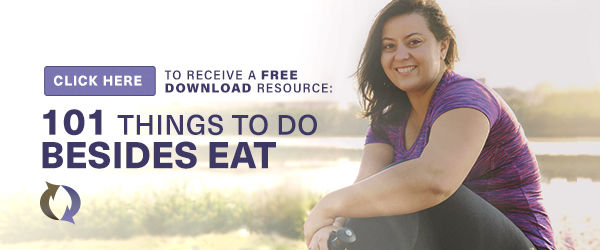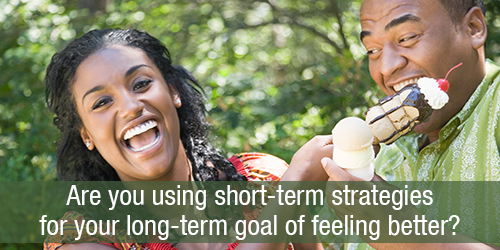If you are one of the many people who “just want to feel better,” be careful of the “I-can-do-anything-for-a-short-period-of-time” thinking that leads to temporary benefits. Instead, think about sustainable changes!
How long can I do this?
 Several years ago, as I mentally prepared for rotator cuff shoulder surgery and the 18 week recovery process, I caught myself thinking, “I can tolerate anything for a short period of time.” That was an appropriate attitude for a self-limited situation.
Several years ago, as I mentally prepared for rotator cuff shoulder surgery and the 18 week recovery process, I caught myself thinking, “I can tolerate anything for a short period of time.” That was an appropriate attitude for a self-limited situation.
But I used to try to get through my diets that way too. I’d start out feeling motivated and committed, thinking I was willing to do anything. I’d tell myself I was making permanent lifestyle changes this time, but I was doing things people who don’t struggle with food simply don’t do.
I didn’t recognize that weighing, measuring, and logging food was disordered eating behavior, not a “healthy lifestyle.”
Somewhere along the line I’d slip into thinking, “How long can I stick to this?” Not very, as it turns out.
Short-term thinking vs. sustainable decision-making
When people just want to feel better and undertake a “self-improvement project,” they often approach it with short-term thinking.
In the name of “getting healthier,” they’ll use short-term strategies to address their long-term goal of feeling better. They might consume shakes and bars; eliminate entire food groups; weigh, measure, count, and log everything they eat; avoid parties, birthday cake, and favorite restaurants; and make numerous other sacrifices they’re willing or able to tolerate for only a short period of time.
Assuming you don’t want to feel better just temporarily, unsustainable lifestyle changes won’t lead to the long-term benefits you’re seeking.
Stop trying to motivate yourself to stick to disordered eating behaviors* permanently with the hope that someday you’ll feel better! Mindful eating is a sustainable decision-making approach that doesn’t depend on restriction and deprivation.
*What is disordered eating?
You can’t diet yourself into mindful eating!
I met a doctor who told me, “I read the first chapter of Eat What You Love, Love What You Eat and it made sense to me immediately. I decided that was how I wanted to live my life when I ‘graduated’.”
“Graduated from what?” I asked. “From dieting,” she answered. She explained she’d been on numerous diets throughout her life and the last diet triggered binge eating. She had convinced herself that when she finally got ‘healthy,’ she would then “graduate” to mindful eating.
But dieting wasn’t getting her any closer to mindful eating—or to being “healthy.” With each round of restriction, deprivation, cravings, emotional eating, bingeing, and guilt, she was moving further from the healthy, balanced, mindful life she craved.
Can I do this every day for the rest of my life?
What if, instead of the unsustainable, “I can tolerate anything for a short period of time” approach, you consider whether your behaviors are truly sustainable?
Ask yourself, could I do this every day for the rest of my life? If not, by definition, this behavior is unsustainable.
If you want to feel better long-term:
- Would you try to ignore hunger? (Hunger is your built-in fuel gauge!)
- Would you regularly eat until you felt uncomfortably full? (You want to feel better after eating, not worse.)
- Would you replace meals with a bar or shake? (Only if it was for your occasional convenience, not as a way to change your body.)
- Would you have that piece of birthday cake? (Probably. Would you have a second or third piece? You could, but maybe not today.)
- Would you track everything you eat or talk incessantly about your diet to anyone who will listen? (I doubt it. You would be too busy living the life you crave!)
- Would you use food to shove down or escape your emotions and needs? (Emotional eating is normal until it becomes the primary way you cope with or avoid your emotions.)
- Would you postpone your life, waiting until you had somehow earned the right to live it? (THIS is your life!)
Mindful eating guides you back to decision-making based on feeling better now. The way to mindful eating is through it: One decision, one bite, one meal at a time. We can help!
This article was updated from a previous version.
Enjoyed this article? Here are three more to help you:
What are you waiting for? This IS your life!
How mindful eating opens the door to mindful living
The differences between goals and intentions


